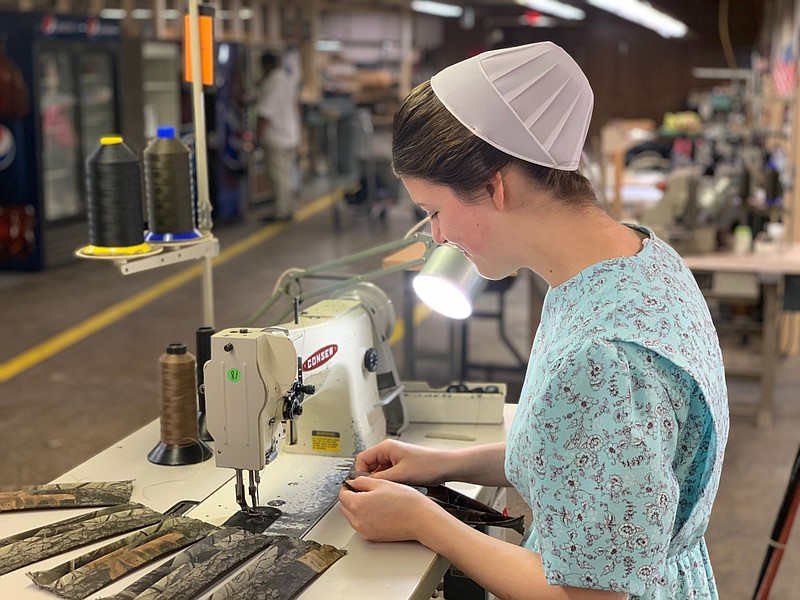Amid the personal protective equipment (PPE) shortages that have pervaded the coronavirus pandemic thus far, one Moniteau County plant is working to help produce and distribute vital gear to those in need locally and nationally.
Tipton's Gokey USA plant has converted a portion of its manufacturing capabilities, typically oriented towards leather goods, to the production of protective face masks, which have been donated locally and sold at a markdown for corporate orders across the country.
So far, the plant has been producing reusable, washable masks, and may even expand to producing hospital gowns for area hospitals. Work to produce PPE at the plant has been ongoing for a little over four weeks so far, with no signs of stopping anytime soon. Masks from Gokey have gone everywhere from Boys Town in Nebraska to a distribution warehouse set up in New York City for health care workers.
The idea all started, plant manager Stacy Doss said, after his wife, a nurse with Capital Region Physicians in Versailles, approached Doss about the possibility of manufacturing masks for the clinic or for Capital Region Medical Center in Jefferson City.
"I mentioned that to the Boyt Harness Company, and then a coworker of mine here knows somebody that works for Capital Region who said they were in need of masks, so we volunteered to donate 1,700 masks made from scrap material we had on hand," Doss said. "Once we started that, Boyt - our parent company - got involved, and knew another company (near them) that needed masks for their production line, so they kind of got involved and ordered more materials."
Once word got out, the corporate orders got rolling - the plant tried to start out undershooting every bid it received in an effort to help out, Doss said, but more recently is just trying to cover the cost of the materials from any paying clients it works with.
Marcus Martin, of the Martin Energy Group in Tipton, reached out, too, wanting to get involved and help out, Boyt Harness president Tony Caligiuri said. The group helped to bring in volunteers from the local Mennonite community, who have lent their assistance to sew masks that are given away to the community and donated to a faith-based charity, while the plant shoulders the larger corporate orders.
"I think the neatest part is you (don't really) hear about Mennonite communities being able to contribute to nationwide efforts," Caligiuri said. "They're somewhat closed off, and sometimes that's intentional on their part. I think they have a big desire to help out as much as they can, and they're fantastic sewers. They produce all their own clothing, so this is a natural thing from them to step right into and help out with. (Martin) and his crew getting this up and running has really been great to work with, and as a society, they have a really can-do, get it done attitude."
Local businesses in Tipton, from restaurants to nursing homes, have seen mask donations from Gokey as well, Doss said. Feedback from members of the community has indicated they're proud of Gokey's efforts, Doss said.
"That's why we started it - I had no idea it'd turn into as much effort as it's been, but it's still ongoing," Doss said.
Other county businesses, such as Burgers' Smokehouse in California, have been recipients as well.
"I thought I was nearing the end, but it seems like it doesn't," Doss said. "About the time we think we're finishing a corporate order and will be caught up and can go back to do some regular production, we get more orders. We've done it for Quaker Windows and several hospitals now."
Essentially, everyone at the plant has been switched over to helping with sewing masks, with guidelines pretty firmly in place for whether the company plans to sell or donate masks from client to client, Caligiuri said.
"If they're a for-profit industry, we're selling the mask," Caligiuri said. "If they're non-profits or health care facilities, then we've been fully donating them. That's been our guidelines. The big deal was about 60 percent of our dealers we sell to are closed. We wanted to keep everybody employed through this, which we have, and we needed to keep them busy doing something. We've got literally anyone that can run a sewing machine making masks right now."
He said it's something of a win-win - while the company would likely have been able to keep building products for inventory amid the pandemic, this venture has ensured everyone can keep working while providing those in need with crucial help during these times.

